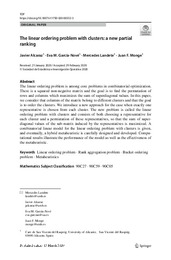Por favor, use este identificador para citar o enlazar este ítem:
https://hdl.handle.net/11000/6277Registro completo de metadatos
| Campo DC | Valor | Lengua/Idioma |
|---|---|---|
| dc.contributor.author | Alcaraz Soria, Javier | - |
| dc.contributor.author | García Nové, Eva María | - |
| dc.contributor.author | Landete Ruiz, Mercedes | - |
| dc.contributor.author | Monge Ivars, Juan Francisco | - |
| dc.contributor.other | Departamentos de la UMH::Estadística, Matemáticas e Informática | es |
| dc.date.accessioned | 2020-09-02T10:14:22Z | - |
| dc.date.available | 2020-09-02T10:14:22Z | - |
| dc.date.created | 2020-02-29 | - |
| dc.date.issued | 2020-09-02 | - |
| dc.identifier.uri | http://hdl.handle.net/11000/6277 | - |
| dc.description.abstract | The linear ordering problem is among core problems in combinatorial optimization. There is a squared non-negative matrix and the goal is to find the permutation of rows and columns which maximizes the sum of superdiagonal values. In this paper, we consider that columns of the matrix belong to different clusters and that the goal is to order the clusters. We introduce a new approach for the case when exactly one representative is chosen from each cluster. The new problem is called the linear ordering problem with clusters and consists of both choosing a representative for each cluster and a permutation of these representatives, so that the sum of superdiagonal values of the sub-matrix induced by the representatives is maximized. A combinatorial linear model for the linear ordering problem with clusters is given, and eventually, a hybrid metaheuristic is carefully designed and developed. Computational results illustrate the performance of the model as well as the effectiveness of the metaheuristic | es |
| dc.description.sponsorship | This work was supported by the Spanish Ministerio de Ciencia, Innovación y Universidades and Fondo Europeo de Desarrollo Regional (FEDER) through project PGC2018-099428-B-100 | - |
| dc.description.sponsorship | and by the Spanish Ministerio de Economía, Industria y Competitividad under Grant MTM2016-79765-P (AEI/FEDER, UE). | - |
| dc.format | application/pdf | es |
| dc.format.extent | 26 | es |
| dc.language.iso | eng | es |
| dc.rights | info:eu-repo/semantics/openAccess | es |
| dc.subject | Linear ordering problem | es |
| dc.subject | Rank aggregation problem | es |
| dc.subject | Bucket ordering problem | es |
| dc.subject | Metaheuristics | es |
| dc.subject.other | 517 - Análisis | es |
| dc.title | The linear ordering problem with clusters: a new partial ranking | es |
| dc.type | info:eu-repo/semantics/article | es |
| dc.identifier.doi | 10.1007/s11750-020-00552-3 | - |
| dc.relation.publisherversion | https://doi.org/10.1007/s11750-020-00552-3 | - |

Ver/Abrir:
21-Alcaraz2020_Article_TheLinearOrderingProblemWithCl.pdf
1,81 MB
Adobe PDF
Compartir:
 La licencia se describe como: Atribución-NonComercial-NoDerivada 4.0 Internacional.
La licencia se describe como: Atribución-NonComercial-NoDerivada 4.0 Internacional.
.png)